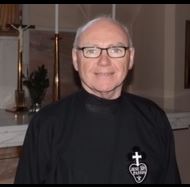Last week I had the most amazing and beautiful response to my log from a lady who had lived across the road from us when I was growing up in Thurso Street in Partick. She recounted her memory, much better than I ever could, of my father’s funeral in St. Simon’s in April 1960, when she and I were just children, with the neighbours filling the street as we walked to the church, and she went on to describe how the experience had stayed with her as a graced moment, and influenced other aspects of her life and faith. I had no memory of this lady, even though we may have played together as children, but then, apart from the families who stayed up the close that we lived in at no. 5, I have no great recall of any of our neighbours back then, but it did bring to mind another experience I had almost 40 years ago.
In the summer of 1977, as a Passionist student, I was working on a project for homeless men in Leeds, most of whom were addicted to one substance or another. The project had been initiated by a Passionist priest, Fr. Paulinus Healey, whom I had first met in the Passionist Retreat House at Coodham in 1969, 6 years before I entered the Passionist Postulancy in Enniskillen. He later went on to become the Catholic Chaplain in Toronto airport but came back to live out his final days in Mount Argus while I was rector there.
The police brought a man in one night and he was assigned to me to look after. The next day I found myself with the rather strange task of walking the city streets in Leeds with this man in search of his false teeth. He was due up in court the following morning and, with his own sense of dignity, didn’t want to appear before the judge without his teeth. He brought me to all the weird and wonderful places he might have lost them, places where he regularly tried to sleep, until eventually we found them in an alleyway adjacent to a hotel where he had bedded down beside a ventilator that was blowing out heat from the kitchen. Delightedly he picked up the teeth, wiped them on his sleeve, and popped them straight into his mouth.
In the course of the day we’d had an interesting conversation. It turned out that he came from Glasgow, which I knew anyway from the first moment he had opened his mouth the night before, having, unlike myself, not lost any trace of his Glasgow accent; but also, that he grew up in the same street, Thurso Street, as I did, went to the same primary school of St. Peter’s, attended the same church of St. Simon’s, and was only one year older than me. We exchanged familiar names and places and memories until slowly I came to a realisation of who this man was and who were his family. As he told me of his slide into addiction and homelessness I couldn’t help but think that “there but for the grace of God go I”.
During that summer, while working on the project, myself and the other students involved had been staying at the Passionist Retreat House in Ilkley, and I remember very vividly coming down to breakfast on our final day, 17th August 1977, and hearing on the news that Elvis Presley had died the day before. It was one of those occasions, like JFK and Princess Diana, where they say you always remember where you were when you heard the news, and that’s certainly true for me in this instance.
That sense of “there but for the grace of God go I” brings to mind this quote from Henri Nouwen about not judging others:
“We spend an enormous amount of energy making up our minds about other people. Not a day goes by without somebody doing or saying something that evokes in us the need to form an opinion about him or her. We hear a lot, see a lot, and know a lot. The feeling that we have to sort it all out in our minds and make judgments about it can be quite oppressive. The desert fathers said that judging others is a heavy burden, while being judged by others is a light one. Once we can let go of our need to judge others, we will experience an immense inner freedom. Once we are free from judging, we will be also free for mercy.”

 RSS Feed
RSS Feed
